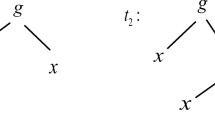Abstract
In recent years, the rapid development of quantum computation has stimulated researchers to establish a theory of computation based on quantum logic. The present study therefore aims to introduce the notion of lattice-valued general orthomodular automaton, for simplicity, lattice-valued GOA. The class of languages, accepted by lattice-valued GOA, is also defined and explicated. Moreover, the acceptance abilities of lattice-valued GOA and their various modifications are compared. Finally, the closure properties of orthomodular languages as union, complement and product are consequently derived.



Similar content being viewed by others
References
Abolpour, K., Zahedi, M.M.: Isomorphism between two BL-general fuzzy automata. Soft. Comput. 16729–736 (2012)
Abolpour, K., Zahedi, M.M.: BL-General fuzzy automata and accept behavior. J. Appl. Math. Comput. 38, 103–118 (2012)
Abolpour, K., Zahedi, M.M.: General fuzzy automata based on complete residuated Lattice-Valued. Iranian Journal of Fuzzy Systems 14, 103–121 (2017)
Abolpour, K. h., Zahedi, M.M., Shamsizadeh, M.: BL-general fuzzy automata and minimal realization: Based on the associated categories. Iranian Journal of Fuzzy Systems 17, 155–169 (2020)
Abolpour, K., Zahedi, M.M.: LB-valued general fuzzy automata. Fuzzy Set. Syst. 442, 288–308 (2022)
Benioff, P.A.: The computer as a physical system: a microscopic quantum mechanical Hamiltonian model of computer s as represented by Turing machines. J. Statist. Phys. 22, 563–591 (1980)
Beran, L.: Orthomodular Lattice (Algebraic Approach), D. Reidel Publishing Company, Dordrecht/Boston/Lancaster (1985)
Birkhoff, G., von Neumann, J.: The logic of quantum mechanics. Ann. Math. 37, 823–843 (1936)
Bruns, G., Harding, J.: Algebraic Aspects of Orthomodular Lattices. In: Coecke, B., Moore, D., Wilce, A. (eds.) Current Research in Operational Quantum Logic: Algebras, Categories, Languages., pp 37–65. Kluwer, Dordrecht (2000)
Cirac, J.I., Zoller, P.: Quantum computation with cold trapped ions. Phys. Rev. Lett. 74, 4091–4094 (1995)
Crutchfield, J.P., Moore, C.: Quantum automata and quantum grammar. Theoret. Comput. Sci. 237, 275–306 (2000)
Deutsch, D.: Quantum theory, the Church–Turing principle and the universal quantum computer. Proc. Roy. Soc. Lond. A400, 97–117 (1985)
Deutsch, D.: Quantum computational networks. Proc. Roy. Soc. Lond. A425, 73–90 (1989)
Doostfatemeh, M., Kremer, S.C.: New directions in fuzzy automata. Int. J. Approx. Reason. 38, 175–214 (2005)
Feynman, R.P.: Simulating physics with computers. Int. J. Theoret. Phys. 21, 467–488 (1982)
Gudder, S.: Basic properties of quantum automata. Found. Phys. 30, 301–319 (2000)
Kalmbach, G.: Orthomodular logic. Z. Math. Logik Grundlagen Math. 20, 395–406 (1974)
Kalmbach, G.: Orthomodular Lattices. Academic Press, London (1983)
Kondacs, A., Watrous, J.: On the power of quantum finite state automata. In: Proceedings 38th Annual Symposium on Foundations of Computer Science, pp 65–75 (1997)
Lloyd, S.: Apotentially realizable quantum computer. Science 261, 1569–1571 (1993)
Takeuti, G.: Quantum Set Theory. In: Beltrametti, E., van Fraassen, B. C. (eds.) Current Issues in Quantum Logics, pp 303–322. Plenum, New York (1981)
Yao, A.C.: Quantum circuit complexity. Proceedings 34th Annual IEEE Symposium on Foundations of Computer Science 352–361 (1993)
Author information
Authors and Affiliations
Corresponding author
Additional information
Publisher’s Note
Springer Nature remains neutral with regard to jurisdictional claims in published maps and institutional affiliations.
Rights and permissions
Springer Nature or its licensor (e.g. a society or other partner) holds exclusive rights to this article under a publishing agreement with the author(s) or other rightsholder(s); author self-archiving of the accepted manuscript version of this article is solely governed by the terms of such publishing agreement and applicable law.
About this article
Cite this article
Abolpour, K., Zahedi, M.M. & Shamsizadeh, M. Lattice-valued General Orthomodular Automata. Int J Theor Phys 62, 13 (2023). https://doi.org/10.1007/s10773-022-05242-3
Received:
Accepted:
Published:
DOI: https://doi.org/10.1007/s10773-022-05242-3




